The Big Picture
Posted on 15 March 2023 by John Mason, BaerbelW, dana1981
As part of our Rebuttal Update Project, this version of The Big Picture article has been updated with more current data in February 2024. You can access the previous version here.
Note: clicking on the images will open a larger version in a separate tab.
It's easy to get bogged down discussing one of the many pieces of evidence behind human-caused global warming, to the extent that we can't see the forest for the trees. Here, we take a step back and see how all of those trees comprise the forest as a whole. Skeptical Science provides extensive resources that examine each individual piece of climate misinformation and rebuts them with hard evidence, so let's make use of these individual pieces to see how they form the big picture.
The Earth is Warming
We know the planet is warming from surface temperature stations and satellites measuring the temperature of the Earth's surface and lower atmosphere. We also have various tools which have measured the warming of the Earth's oceans. Satellites have measured an energy imbalance at the top of the Earth's atmosphere. Glaciers, sea ice, and ice sheets are all receding. Sea levels are rising. Spring is arriving sooner each year. There's simply no doubt - the planet is warming. Everything to do with temperatures is going up. Everything to do with snow and ice is decreasing. Species are migrating polewards and to higher altitudes (Figure 1).
Figure 1: Indicators of a warming world (click for larger image)
Global Warming Continues
And yes, the warming is continuing. The 2010s were warmer than the 2000s, which were hotter than the 1990s, which were hotter than the 1980s, which were hotter than the 1970s. 2023 was the hottest year on record (Figure 2). Temperature datasets are in excellent agreement on this matter. Sea levels are still rising, ice is still receding, spring is still coming earlier and that planetary energy imbalance continues apace.
Figure 2: Four surface-station based estimates of global warming since 1880 (courtesy RealClimate)
Contrary to what the Merchants of Doubt would like us to believe, and they have tried this one more than once, the planet has not magically stopped warming. Those who argue otherwise are confusing short-term noise with long-term global warming (Figure 3).
Figure 3: This version of the Escalator graphic is based on data including the year 2022. The previous versions are still available here with data including 2015 or as a video including 2016. When Robert Rohde updated the escalator and produced a staircase of denial in January 2023, it motivated us to follow suit and to update our escalator with the latest available data as well. (click for a larger version)
El Niño-Southern Oscillation (ENSO)
Foster and Rahmstorf (2011) showed that when we filter out the short-term effects of the sun, volcanoes, and El Niño cycles, the underlying man-made global warming trend becomes even more clear (Figure 4).
Figure 4: Temperature data (with a 12-month running average) before and after the short-term factor removal, from Foster & Rahmstorf (2011).
Although such influences are sources of climate variability, the following plot of ENSO shows that El Nino (warm) and La Nina (cool) years, plus ENSO-neutral years (Figure 5), are all steadily getting warmer: they are simply noise on an upwards trend:
Figure 5: GISTEMP anomalies (with regard to the late 19th Century, colour-coded according to the status of ENSO in the early spring. Reds are El Nino years, blues La Nina and greys neutral. (courtesy RealClimate)
Global energy inventory
For as much as atmospheric temperatures are rising, the amount of energy being absorbed by the planet is even more striking when one looks into the deep oceans and the change in the global heat content (Figure 6).
Figure 6: Global energy inventory, 1971-2018, showing the breakdown of components, as indicated in the legend. Graphic from IPCC AR6 Working Group 1, Box 7.2 fig.1.
Over 90% of global warming goes into heating the oceans. When taking the heating of the entire climate system into account, the planet has warmed at a rate equivalent to 4 Hiroshima atomic bomb detonations per second over the past 15 years (Figure 7).
Figure 7 - Heat Widget from 4Hiroshimas
Humans are Increasing Atmospheric Greenhouse Gases
The amount of greenhouse gases in the atmosphere - particularly carbon dioxide (CO2) - has been rising steadily over the past 150 years. There are a number of lines of evidence which clearly demonstrate that this increase is due to human activities, primarily burning fossil fuels.
The most direct of evidence involves simple accounting. Humans are currently emitting approximately 44 billion tons of CO2 per year. That CO2 doesn't simply vanish. Half of it stays in the atmosphere, while the other half is absorbed by the oceans (which is causing another major problem - ocean acidification).
We also know the atmospheric increase is from burning fossil fuels because of the isotopic signature of the carbon in the atmosphere. Carbon comes in three different isotopes, and plants have a preference for the lightest one, carbon 12. Anything that eats plants, or eats things that eat plants, inherits that light carbon signature. So do the colossal tonnages of geological deposits made from ancient life - in other words the fossil fuels. So if the fraction of carbon 12 in the atmosphere is increasing, which it is, we know the increase is due to burning fossil fuels.
The fact that humans are responsible for the increase in atmospheric CO2 is settled science. The evidence is clear-cut.
Human Greenhouse Gases are Causing Global Warming
There is overwhelming evidence that humans are the dominant cause of the recent global warming, mainly due to our greenhouse gas emissions. Based on fundamental physics and math, we can quantify the amount of warming human activity is causing, and verify that we're responsible for essentially all of the global warming over the past 3 decades. The aforementioned Foster and Rahmstorf (2011) found a 0.16°C per decade warming trend since 1979 after filtering out the short-term noise.
In fact we expect human greenhouse gas emissions to cause more warming than we've thus far seen, due to the thermal inertia of the oceans (the time it takes to heat them). Human aerosol emissions are also offsetting a significant amount of the warming by causing global dimming. Huber and Knutti (2011) found that human greenhouse gas emissions have caused 66% more global warming than has been observed since the 1950s, because the cooling effect of human aerosol emissions have offset about 44% of that warming. Figure 8 shows a more recent assessment (from IPCC AR6) of the components of the overall temperature forcing.
Figure 8: Contributions of individual forcing agents to the total change in the decadal average temperature for the period 1971-2018. Graphic from IPCC AR6 Working Group 1, Box 7.2 fig.1 panel (e). LH scale is energy change in ZJ. Click image to see the full graphic.
Fingerprints in the climate system
There are also numerous 'fingerprints' which we would expect to see from an increased greenhouse effect (i.e. more warming at night, at higher latitudes, upper atmosphere cooling) that we have indeed observed (Figure 9).
Figure 9: Observed 'fingperprints' of man-made global warming (described here and here).
Climate models have projected the ensuing global warming to a high level of accuracy, verifying that we have a good understanding of the fundamental physics behind climate change.
Sometimes people ask "what would it take to falsify the man-made global warming theory?". Well, basically it would require that our fundamental understanding of physics be wrong, because that's what the theory is based on. This fundamental physics has been scrutinized through scientific experiments for decades to centuries.
The Warming will Continue
We also know that if we continue to emit large amounts of greenhouse gases, the planet will continue to warm. We know that the climate sensitivity to a doubling of atmospheric CO2 from the pre-industrial level of 280 parts per million by volume (ppmv) to 560 ppmv (at the beginning of 2023 we were at 420 ppmv) will cause 2–4.5°C of warming. And we're headed for 560 ppmv in the mid-to-late 21st century if we continue business-as-usual emissions.
The precise sensitivity of the climate to increasing CO2 is still fairly uncertain: 2–4.5°C is a rather wide range of likely values. However, even if we're lucky and the climate sensitivity is just 2°C for doubled atmospheric CO2, if we continue on our current emissions path, we will commit ourselves to that amount of warming (2°C above pre-industrial levels) within the next 75 years.
The Net Result will be Bad
There will be some positive results of this continued warming. For example, an open Northwest Passage, enhanced growth for some plants and improved agriculture at high latitudes (though this will require use of more fertilizers), etc. However, the negatives will almost certainly outweigh the positives, by a long shot. We're talking decreased biodiversity, water shortages, increasing heat waves (both in frequency and intensity), decreased crop yields due to these impacts, damage to infrastructure, displacement of millions of people, etc. (Figure 10).
Figure 10: Simplified presentation of the five Reasons for Concern burning ember diagrams as assessed in IPCC AR6 Working Group 2 Chapter 16 (adapted from Figure 16.15, Figure FAQ 16.5.1).
Arguments to the contrary are superficial
If there's one theme we've found in studying politically-motivated criticisms of climate science, it's that they're consistently superficial. For example, the criticisms of James Hansen's 1988 global warming projections never go beyond "he was wrong," when in reality it's important to evaluate and learn from such projections and their outcome i.e.what actually happens. Then again, those who argue that "it's the Sun" ignore the fact that we understand the major mechanisms by which the Sun influences the global climate: furthermore we study and monitor them on a continual basis. We know it's not the Sun because the data say so. Finally, those who argue "it's just a natural cycle" can never seem to identify exactly which natural cycle can explain the current warming, nor can they explain how our understanding of the fundamental climate physics is wrong.
There are legitimate unresolved questions
Much ado is made out of the expression "the science is settled." The science is settled in terms of knowing that the planet is warming rapidly, and that humans are the dominant cause.
There are certainly unresolved issues. As noted above, there's a big difference between a 2°C and a 4.5°C warming for a doubling of atmospheric CO2, and it's an important question to resolve, because we need to know how fast the planet will warm in order to know how fast we need to reduce our greenhouse gas emissions. There are significant uncertainties in some feedbacks which play into this question. For example, will clouds act as a net positive feedback (by trapping more heat, causing more warming) or negative feedback (by reflecting more sunlight, causing a cooling effect) as the planet continues to warm? And exactly how much global warming is being offset by human aerosol emissions?
These are the sorts of questions we should be debating, and the issues that many climate scientists are investigating. Unfortunately there is a very vocal contingent of people determined to continue arguing the resolved questions for which the science has already been settled. And when climate scientists are forced to respond to the constant propagation of misinformation on these settled issues, it just detracts from our investigation of the legitimate, unresolved, important questions.
Smart Risk Management Means Taking Action
People are usually very conservative when it comes to risk management. Some of us buy fire insurance for our homes when the risk of a house fire is less than 1%, for example. When it comes to important objects like cars and homes, we would rather be safe than sorry.
But there is arguably no more important object than the global climate. We rely on the climate for our basic requirements, like having enough accessible food and water. Prudent risk management in this case is clear. The scientific evidence discussed above shows indisputably that there is a risk that we are headed towards very harmful climate change. There are uncertainties as to how harmful the consequences will be, but uncertainty is not a valid reason for inaction. There's very high uncertainty whether I'll ever be in a car accident, but it would be foolish of me not to prepare for that possibility by purchasing auto insurance. Moreover, uncertainty cuts both ways, and it's just as likely that the consequences will be worse than we expect as it is that the consequences won't be very bad.
We Can Solve the Problem
The good news is that we have the tools we need to mitigate the risk posed by climate change. A number of plans have been put forth to achieve the necessary greenhouse gas emissions cuts (i.e. here and here and here). We already have all the technology we need.
Opponents often argue that mitigating global warming will hurt the economy, but the opposite is true. Those who argue that reducing emissions will be too expensive ignore the costs of climate change - economic studies have consistently shown that mitigation is several times less costly than trying to adapt to climate change (Figure 11).
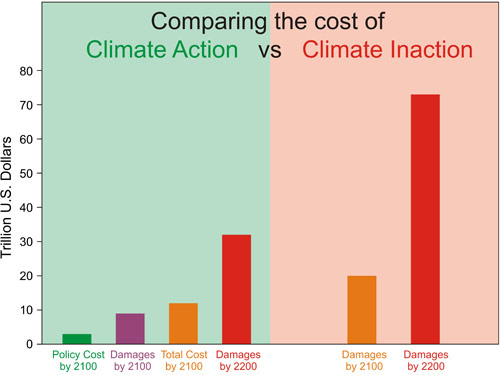
Figure 11: Approximate costs of climate action (green) and inaction (red) in 2100 and 2200. Sources: German Institute for Economic Research and Watkiss et al. 2005
This is why there is a consensus among economists with expertise in climate that we should put a price on carbon emissions (Figure 12).
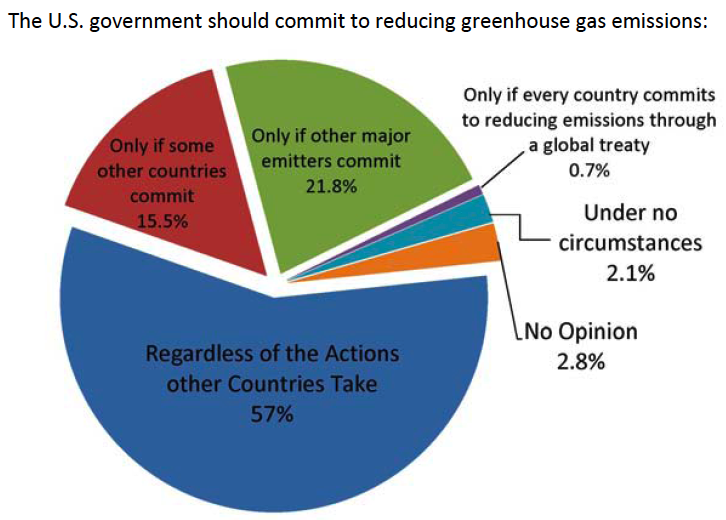
Figure 12: New York University survey results of economists with climate expertise when asked under what circumstances the USA should reduce its emissions (Policy Brief: Economists and Climate Change. Consensus and Open Questions, Holladay et al. 2009)
The Big Picture
The big picture is that we know the planet is warming, humans are causing it, there is a substantial risk to continuing on our current path, but we don't know exactly how large the risk is. However, uncertainty regarding the magnitude of the risk is not an excuse to ignore it. We also know that if we continue on a business-as-usual path, the risk of catastrophic consequences is very high. In fact, the larger the uncertainty, the greater the potential for the exceptionally high risk scenario to become reality. We need to continue to decrease the uncertainty, but it's also critical to acknowledge what we know and what questions have been resolved, and that taking no action is not an option. Th good news is that we know how to solve the problem, and that doing so will minimize the impact not only on the climate, but also on the economy.
The bottom line is that from every perspective - scientific, risk management, economic, etc. - there is no reason not to immeditately take serious action to mitigate climate change. Failing to do so would be exceptionally foolish. Or, as the late Nobel Prize-winning scientist Sherwood Rowland (1927-2012), who made the 1970s discovery that chlorofluorocarbons (CFCs) in our atmosphere cause major damage to Earth's ozone layer, put it many years ago:
"What's the use of having developed a science well enough to make predictions if, in the end, all we're willing to do is stand around and wait for them to come true?"































 Arguments
Arguments






















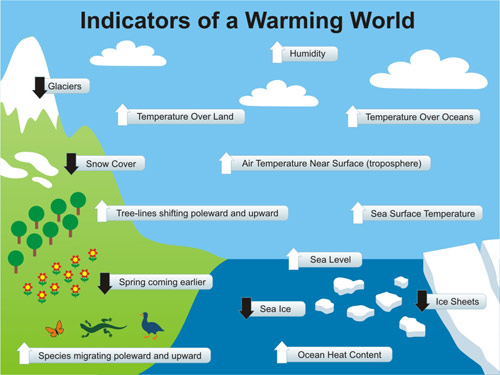
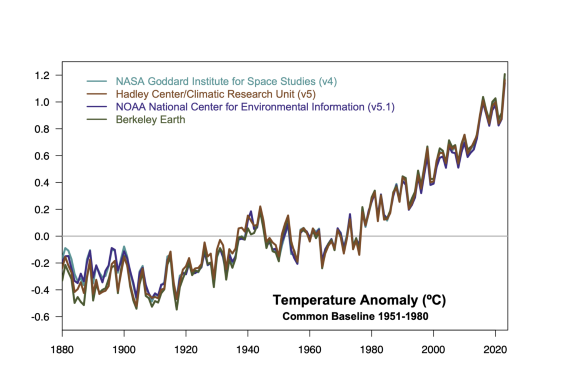
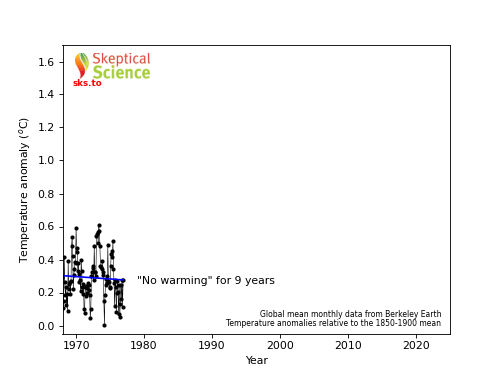
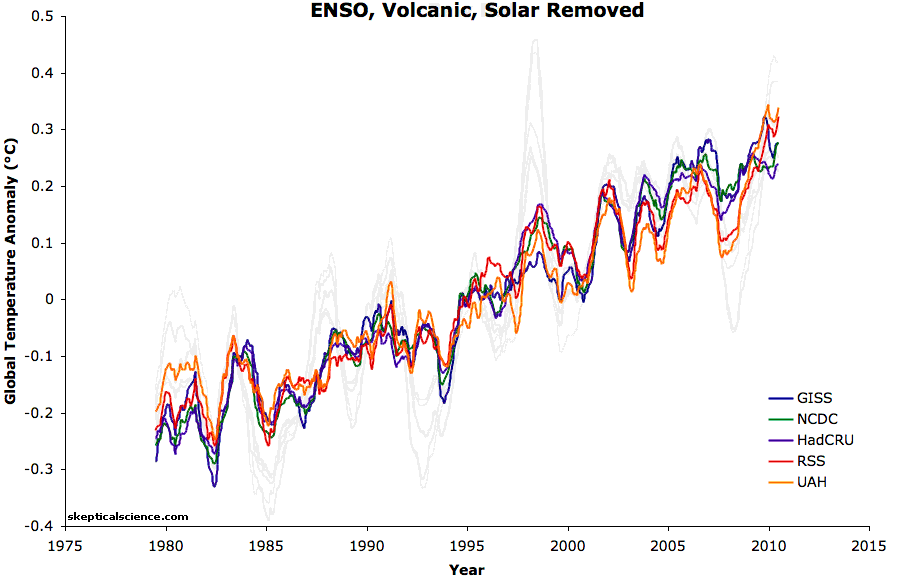
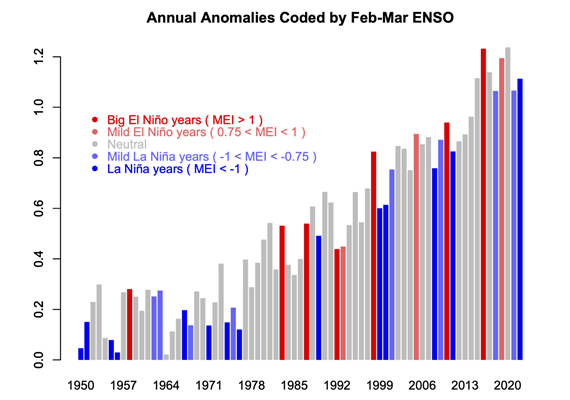
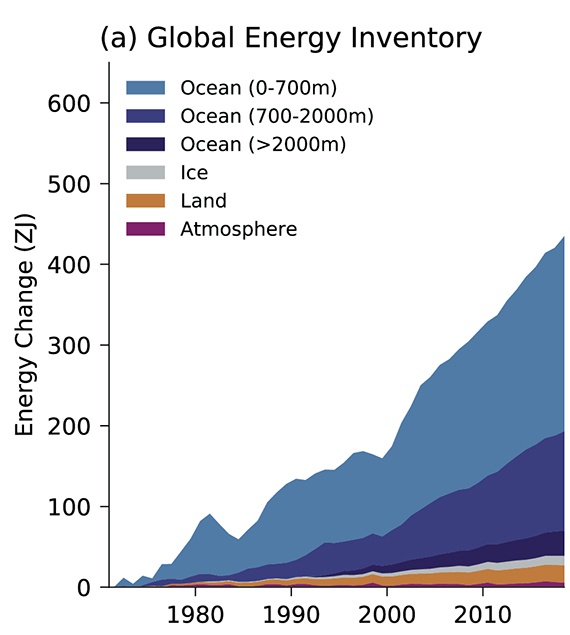
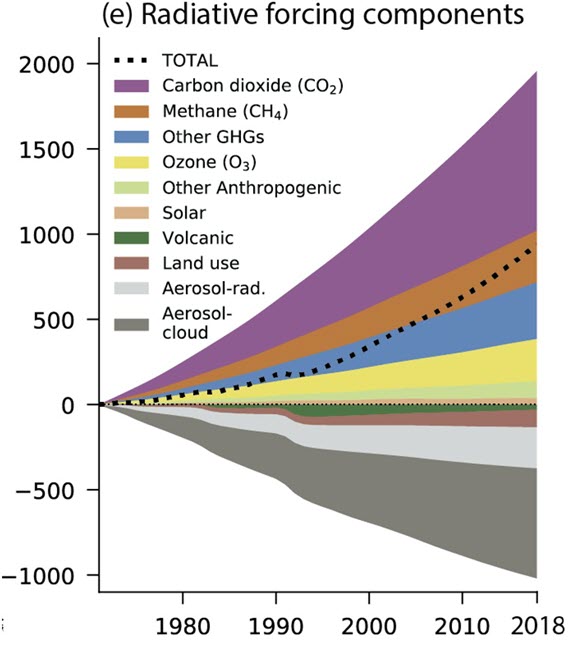
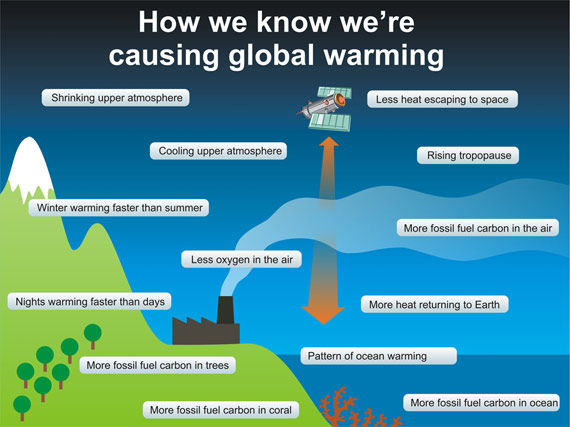
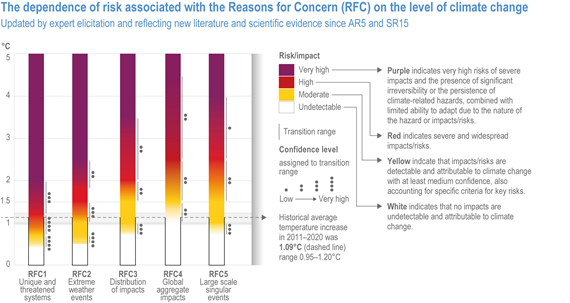









2001: https://www.weather.gov/ffc/hichart
2013: https://www.python-graph-gallery.com/heatmap-for-timeseries-matplotlib
2014: https://stackoverflow.com/questions/26734065/simple-heatmap-of-temperature-in-r-ggplot2
I could go on and on...
Rob Honeycutt @151
"I could go on and on..."
You allready do. But let's stop the discussion. You made your point, there was a function available before 2015. I don't use R. I programmed the graphics myself.
Bart... "You already do."
Yes. I tend to take exception when people accuse others without justification.
I also notice a pattern here where you don't fully research your claims once you've determined what you want to believe. You were not the first to create temperature bars on a graph, and the gravitational effects from the Greenland ice sheet are not going to reduce the Netherlands' risk from sea level rise.
When you make claims like these it's very important to take the time to be thorough and accurate with what you're stating, and I don't see that you're taking the time to do that.
Bart Vreeken,
There have been a lot of posts discussing a variety of topics here . I am not sure just what points you are trying to make. Can you summarize your position with a few bullet points saying what you are trying to show.
Hi Rob @153
"the gravitational effects from the Greenland ice sheet are not going to reduce the Netherlands' risk from sea level rise."
Looks like you still don't understand the topic completely. I stated that only 12.5% of the meltwater of Greenland comes to the Netherlands. So yes, the gravitational effect does reduce the risk from sea level rise in NL a little.
"You were not the first to create temperature bars on a graph"
When I started with that I hadn't seen it anywhere else. But of course I can't oversee everything. I didn't research the complete Internet then. My remark about the inspriration for the Climate Stripes was just my opinion, just a site remark and not my main message of @131. You make it more important then it was.
Bart Vreeken @131,
There was no question. I was presenting an understanding based on observations of evidence in your comments. Your presented interpretation of my comments appears to support my observation in my comment @99 that:
"There is a wealth of evidence in Bart’s comment history that appears to indicate that their interests are not Big Picture. Their interests appear to be much smaller/narrower. They appear to be seeking ‘positive perceptions from the perspective of short-term regional interests’."
I have made other comments about the harm of pursuing positive perceptions because it delays learning the Truth about the Big Picture harm being done to the future of Humanity. Arguing for a 'positive, less panicked, perspective' has produced the current serious harm, and risk of more significant harm, to the future of humanity that is presented in the article I pointed to in my comment @130. Another report on that same topic is by NPR "Cut emissions quickly to save lives, scientists warn in a new U.N. report".
The harmful reality you appear try to avoid understanding, even if you present global interpretations, is not altered by speculation based on one year of heavy snow fall on Antarctica and an unsubstantiated perceived correlation between snowfall and sea ice extent, or because Greenland may only melt on its east coast (conclusions you appear to be interested in jumping to).
Also, as I presented in my comment @68, the very negative (panic level severity) of possible outcomes is what the people who benefit most from the harm need to 'mitigate'. It is important to understand that what is referred to as 'climate change impact adaptation' is mitigation required by others because of a failure of harmful people (success from their short-term limited regional interest perspective) to mitigate their harmfulness. And part of how the harmful try to justify being more harmful is by claiming that "It's not that Bad = positive perceptions that the harm is not very significant" or "Harm done is worth it because of the Perceived Positives".
The Big Picture understanding is that it is generally unacceptable to use benefits or potential benefits to excuse harm done or potential harm done. The only case where that 'may be' acceptable is a case where the individual pursuing or obtaining the benefit will be the only one suffering any harm. It does not even apply to a group because different members of a group may obtain different degrees of harm and benefit.
In spite of that undeniable Big Picture understanding regarding the importance of learning to minimize harm and help those who have been harmed, many people today try to excuse continuing to pursue more benefit from being more harmful. And part of their harmful effort is the pursuit of harmful misunderstandings or a focus on 'positive perceptions that minimize the need for helpful mitigation by reducing the perceptions of severity of harm being done' (like claiming that less fortunate people deserve to be less fortunate, or being dismissive of what is happening to places like Bangladesh).
Bart... "But of course I can't oversee everything. I didn't research the complete Internet then."
Nor have I researched the complete internet. I merely spent 10-15 mins doing trying some very basic search terms and came up with all these examples. It's not that difficult.
And that's kind of the point. If you're going to insinuate that someone stole your idea, maybe it would be a good idea to make at least a minimal effort to check to see if your "opinion" is correct or not.
This is basic professional courtesy, Bart.
Bart... "Looks like you still don't understand the topic completely."
Is that another "opinion" of yours, make without doing even a minimal amount of research?
Previously, far up in this thread, you stated that the Netherlands "profits from" (I'm interpreting that to mean "benefits from") the gravitational effects of the melting Greenland ice sheet. The paper that you cited claimed the effect on the Netherlands was negligible over the previous decade, and makes no claims about projected effects.
Are you claiming the author of the paper you cited doesn't understand this topic completely?
Hi Rob @158
When you're willing to read something wrong there is allways a possibility.
The Netherlands benefit from the gravitational effects. What gravitational effect? The gravitational effects of the melting of the Greenland Ice Sheet. Becaurse of these effects we will only see some 12.5% (or even less) of the melting water coming here. That's better then 100%, so there is a benefit.
The KNMI calls this 'neglecteble' and I do agree with that. For they know what they are talking about.
NB a spelling check should help here. Sorry for that.
I feel like I just stepped on Mars.
Does the data confirm that we humans will be so restricted in our activities that life won't be worth living?
Please tell me why children as youg as FIVE are the target of your agenda.
Assuming that preventing a climate catastrophe is your goal, would you like to completely remove all
humans in pursuit of obtaining it?
Mr moderator— these are questions. Not statements. I do NOT agree with the "settled science," as science is NEVER settled. But if you forsee me causing a problem in my dissent, please--change my mind.
[BL] We are quite familiar with the "Just asking questions" style of "debate". It will not get you far here, and it does not suggest that you are open to any ideas that might change your mind.
You should start by reading the comments policy.
Bart @160... "The Netherlands benefit from the gravitational effects."
Please show me research that actually makes this claim rather than just your interpretation of a graph that disagrees with the statements made by the authors of the paper.
I'm honestly open to being convinced by the research, but the research is going to have to actually make claims (in words) that support your statement.
NoRightsNoProblem @161... On top of what the moderator points out is a poor debate approach, your "questions" are all straw men since no one says any of what you're stating.
Bart @ 147 says "As far as I know."
Yes Bart. We've seen you use this sort of ploy before. Stick some sort of qualifier on your statement so that you can avoid the logical implications of your claims.
For what it is worth, seeing you say "As far as I know" makes me think "yes, Bart knows so little". That makes you ignorant: "not knowing (a fact or facts), unaware (of something)". That can be changed by learning, but you show all signs of wanting to stick to your beliefs. That indicates willful ignorance. That is not a positive character trait.
Any idea that you present that you originated some form of graphical display of temperature data has been conclusively demonstrated to be false. That you continue this charade is a form of puffery (the act of puffing: an opinion or judgment, often made by the seller of property to a potential buyer, that is not made as a representation of fact.
@ 155, you say "was just my opinion". Wild guesses. Opinions. Whatever.
For someone who has demonstrated such a poor ability to express himself, or to recognize the context of material he reads and spouts quotes from, it's pretty rich to see you saying things like "Looks like you still don't understand the topic completely". You are in no position to be claiming any sort of intellectual or knowledge high ground.
You just keep digging yourself a deeper hole You really should take your own advice when you said "But let's stop the discussion".
[BL] Mission accomplished.
NoRightsNoProblems @165~168 ,
Thanks for the laugh. Even though it's old material.
If you get better educated, you would ask better questions.
Hint : science-denialists generally fail to get educated because they keep their minds open at the bottom, not at the top. That is why they keep asking the same questions over and over, for decade after decade. They never learn, because they don't wish to learn. [ My apologies for that untactful Home Truth. ]
[BL] Response to deleted comments snipped.
N R N P @168
Shall I have a try in answering your questions? I live in The Netherlands and here we have the same kind of discussions. Excuse me in advance for my English, it seems to be horrible.
A. Changing for the worse?
I hope we do agree that the earth is warming. It's an on going process and we (science) expect that it will go on for a much longer time. So it gives a lot of changes in the climate almost everywhere.
A key point is that the continents and the oceans are warming in a different speed. The oceans are warming much slower. This has consequences. When the atmosphere warms up it can contain more water vapor. But the less warming ocean can't deliver enough water vapour to keep the more warming continents humid enough. As a result there is more risk for drought at many places.
An other thing is that the air whole circulation will change. It means that local climates can change more than the global average. Wet climates can turn to dry climates, but also the other way round. Our agriculture, infrastructure and houses are not (always) prepared for that.
As you know, a warmer climate makes the sea level rise. The warmer water in the ocean expands, the ice sheets and mountain glaciers are melting to a certain extent. This sea level rise will give a lot of problems in many coastal areas. Here in the Netherlands the protection against the sea is very well organized, we can manage the first one or one-and-a-halve meter in this century. When it gets more we have a problem, but we are already try to prepare for that. Other countries, including deltas in Asia and parts of the US are less protected and will have large problems before 2100. By the way, it's not only the sea level rise there. Many of these places have also subsidence of the land, but these two come together and the problems are coming much faster then without sea level rise.
And then there is the unpredictable part. We don't know exactly how the ice sheets will react. Maybe there are mechanisms for a quick decline of parts of the ice sheets. In that case we have less time to prepare for it.
Of course, there can also be places where the climate gets better, or at least in a part of the year. And at least, we will need less fuel for warming the houses. (but more electricity for cooling in the summer.)
An interesting point is the direct effect of the increasing CO2 level to the vegetation and the agriculture. Plants can grow faster with that. Remote sensing shows something like 'global greening'. But it's a mixture of natural response and increasing agriculture. The last thing is tricky when water recourses are limited. And as we have seen, the increasing risk for drought is a cause for concern by itself. Maybe you know the story of the Aral See?
Then your question B) changing because of human activities?
Yes, we can be sure about this. We could calculate the effect of increasing CO2 hundred years ago and it's just what happening. Other possible factors, like changing sun power don't have much effect, these changes are too small. The less known part is how the atmosphere reacts (water vapor, clouds), how the ocean circulation reacts, how ice sheets react in detail.
"C) why this time it is different than the changes that have taken place?"
The changes are going very fast now, and as I said, the houses, the infrastructure, the agriculture and the water supply are not prepared for these changes. And there is the risk for sudden, even faster changes (tipping points).
][BL Response to deleted comments snipped